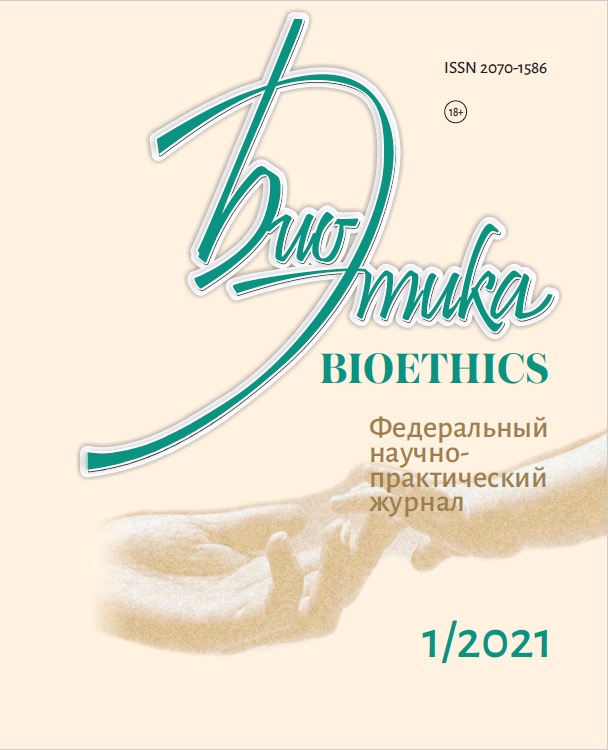UNDERSTANDING OUTCOMES OF THE PANDEMIC: SAFETY ETHICS
- 作者: Filippov A.V.1, Donika A.D.2, Ostrovsky A.M.3
-
隶属关系:
- Volgograd State Medical University
- Volgograd Medical Scientific Center, FSBEI HE VolgSMU MOH Russia
- Gomel State Medical University
- 期: 卷 14, 编号 1 (2021)
- 页面: 32-35
- 栏目: Practical bioethics
- ##submission.datePublished##: 02.06.2021
- URL: https://bioethicsjournal.ru/2070-1586/article/view/71228
- DOI: https://doi.org/10.19163/2070-1586-2021-1(27)-32-35
- ID: 71228
如何引用文章
全文:
详细
Summing up the interim results in the fight against the COVID-19 pandemic determines a multidisciplinary approach to studying the problem of security for all spheres of society. The analysis of the priority of scientific publications carried out on the platform of the information resource CyberLeninka showed that the main interest of researchers is medical and information security. Taking into account the tendency for legal norms to lag behind ethical ones, and the specifics of the legal support of these spheres of social life, a working hypothesis was developed based on the assumption that the explication of ethical challenges during the COVID-19 pandemic will determine the strategy of social policy in these priority areas. Quantitative and qualitative sociological methods (content analysis, case study, survey) were used in the work. Fragments of sociological research carried out in collaboration based on the Volgograd and Gomel State Medical Universities are used. The results obtained demonstrate ethical deformations in the medical and, in general, in the social sphere. In the context of the pandemic, the problem of the vulnerability of socially unprotected groups has become more acute. The basic moral tenets of the ethics of care are violated in relation to patients with severe concomitant diseases and patients with limited mobility. The extreme conditions which the national health care system found itself began to be perceived in the professional group of medical specialists as "extenuating circumstances" allowing, in conditions of survival, to neglect not only medical ethics, but also the law. These tendencies are reflected in the minds of future doctors, which requires strengthening the positions of the humanitarian block of disciplines in the curricula of professional education. The tendencies noted have an international nature, which determines the possible implementation of the approaches developed in the process of international collaboration into the practice of humanitarian national professional education.
作者简介
A. Filippov
Volgograd State Medical University
编辑信件的主要联系方式.
Email: fav-aleksei@yandex.ru
postgraduate student of the Department of Philosophy, Bioethics and Law with a course in the sociology of medicine, FSBEI HE VolgSMU MOH Russia, Volgograd,
俄罗斯联邦A. Donika
Volgograd Medical Scientific Center, FSBEI HE VolgSMU MOH Russia
Email: addonika@yandex.ru
Doctor of Sociology, Professor, Senior Researcher of the Department of Ethical, Legal and Sociological Expertise in Medicine, Volgograd Medical Scientific Center, Professor of the Department of Philosophy, Bioethics and Law with the course of sociology of medicine, at the FSBEI HE VolgSMU MOH Russia, Head of the Russian Unit of the International Network of UNESCO Chair in Bioethics, Volgograd,
A. Ostrovsky
Gomel State Medical University
Email: Arti301989@mail.ru
master of medical sciences, senior lecturer at the Department of Public Health and Health with the course of the Faculty of Professional Development and Retraining EI «Gomel State Medical University», Gomel, Belarus
参考
补充文件







